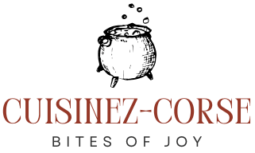Table of Contents
ToggleLast month, a client showed me her Pinterest board filled with sleek, all-white spaces. But when we redesigned her space, she fell in love with warm oak cabinets and a handcrafted tile backsplash. That shift—from sterile to soulful—defines what’s happening in homes now.
Designers agree: 87% see clients craving texture over cold minimalism. It’s not just about looks. Natural materials like limestone and walnut add depth while standing the test of time. Even small updates, like swapping hardware or adding woven stools, can transform a room.
Pinterest saves for organic modern kitchens surged 210% since 2023. Why? These spaces balance function with artistry. Think curved islands, hidden appliances, and earthy hues. For more inspiration, explore the latest design shifts blending personality with practicality.
What sticks? Focus on elements you’ll love for years. Zillow notes homes with character-rich kitchens sell 12% higher. Start small—maybe with terracotta pots or a mossy green accent wall—and let your space evolve.
1. Rounded Cabinetry: Softening Modern Kitchens
Sharp edges are fading into the past. More homeowners crave fluid lines that blend warmth with contemporary style. Rounded cabinetry transforms spaces, making them feel inviting yet polished.
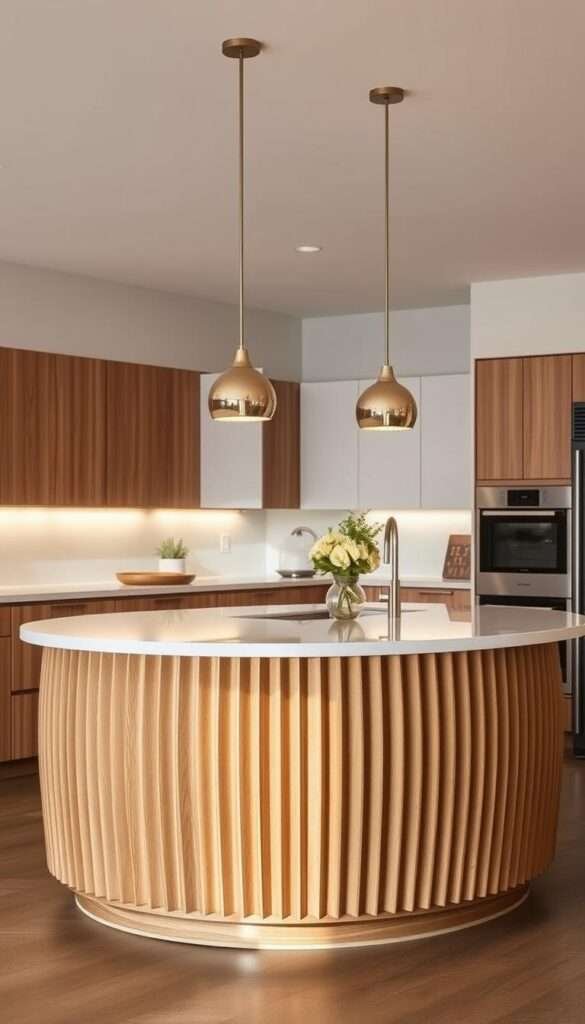
Curved Corners Meet Natural Materials
Studio Johnston’s family home proves curved cabinets shine when paired with organic textures. Glossy white units pop against limewash walls, while walnut accents ground the design. This mix creates depth without overwhelming the space.
Key benefits of rounded edges:
- Better flow: 12″-18″ radius corners ease movement in galley kitchens
- Visual calm: Stefania Reynolds’ open-concept space uses curves to reduce clutter
- Timeless appeal: Victorian butteries inspired today’s arched pantries
Modern-Traditional Fusion with Elegant Arches
White Studio & Co merges Shaker-style bases with arched uppers for a fresh twist. Their eggshell finish hides fingerprints—perfect for busy households. Meanwhile, Bidgood’s dusted blue cabinetry shows how curves enhance cottagecore charm.
| Feature | Impact | Cost Consideration |
|---|---|---|
| Radius edges | 63% of renovators prefer them (2025 Houzz survey) | Adds 15-20% to cabinet costs |
| Matte finishes | Hides smudges better than lacquered surfaces | Same price as standard finishes |
| Arched uppers | Visually lowers high ceilings | No extra charge for this design |
For families, rounded cabinetry offers built-in safety. No sharp corners mean fewer bumps for toddlers. The soft shapes also boost resale value—Zillow notes character-rich kitchens command higher prices.
Want more ideas? Explore these jaw-dropping designs that balance form and function.
2. Integrated "Cupboard" Appliances for Seamless Design
Nothing disrupts a kitchen’s flow like bulky, mismatched appliances. Today’s designs hide them behind cabinetry for a polished look. This trend blends function with artistry, turning necessities into aesthetic features.
Dutch Larder Cupboards as Statement Pieces

Dutch larders combine storage and style. They often include spice racks, marble cooling slabs, and integrated bins. Nina Farmer’s Semihandmade collaboration proves how wood panels can disguise a fridge effortlessly.
Key perks of these cupboards:
- Multi-functional: Store perishables on marble slabs while keeping spices organized
- Customizable: IKEA’s 2025 modular fronts offer budget-friendly options
- Ventilation-ready: Proper airflow ensures concealed dishwashers perform optimally
Hidden Refrigerators with Vintage Charm
Vaughan Design reimagined refrigeration by mimicking 1920s iceboxes. Crossbuck detailing and panel-ready fronts create nostalgia. Sarah Sherman Samuel’s DIY magnetic bead panels offer a clever hack for standard fridges.
Consider these before concealing appliances:
- Material choice: MDF resists humidity better than plywood for paneling
- Accessibility: Keep microwave controls visible for daily use
- Cost: Panel-ready models cost 30% more but unify the space
Luxury kitchens lead this shift—58% now use fully integrated refrigeration. Whether you choose a Dutch larder or a disguised fridge, the goal is harmony.
3. Bold Color Pops: From Mint Green to Brick Red
While touring a Brooklyn brownstone last week, I noticed how mint-green cabinets transformed an ordinary space. Color isn’t just an accent—it’s the soul of modern design. From zellige tile backsplashes to baby blue lowers, bold choices create unforgettable kitchens.
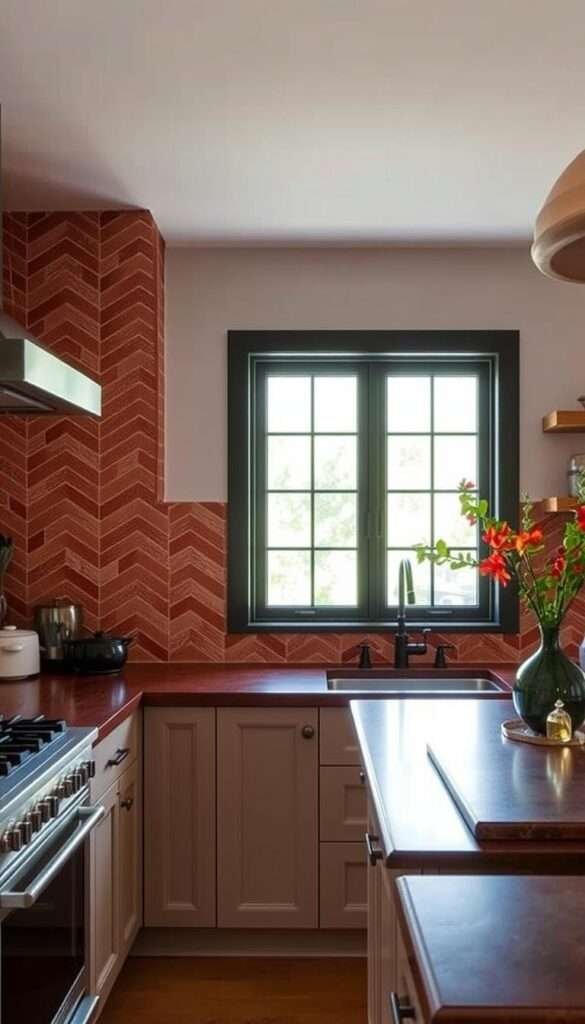
Zellige Tile Backsplashes as Focal Points
Rebecca Zajac’s kitchen proves zellige tiles steal the show. Their handmade appeal lies in uneven glazes—each piece varies 30% in thickness. This creates depth that mass-produced tiles can’t match.
Cost breakdown:
- Authentic Moroccan: $45/sqft (import fees included)
- Domestic equivalents: $28/sqft (less texture variation)
For renters, tempered glass backsplashes overlay existing tiles. Peel-and-stick options offer similar drama without commitment.
Unexpected Accents (Like Baby Blue Cabinets)
a.NABER DESIGN’s project features Benjamin Moore’s Breath of Fresh Air on lower cabinets. The baby blue hue pairs with brass pulls for a playful yet polished look.
Follow the 70-20-10 rule:
- 70% neutral base (walls, floors)
- 20% secondary tone (cabinets)
- 10% bold accent (open shelving, stools)
In sunlit spaces, use UV-resistant paints to prevent fading. Farrow & Ball’s Estate Emulsion withstands daily wear while keeping hues vibrant.
Pantone’s 2025 Peach Echo is emerging as a fresh accent. Try it on window trims or pendant lights for warmth. Remember—72% of Millennials now prefer colorful kitchens over sterile whites (NKBA).
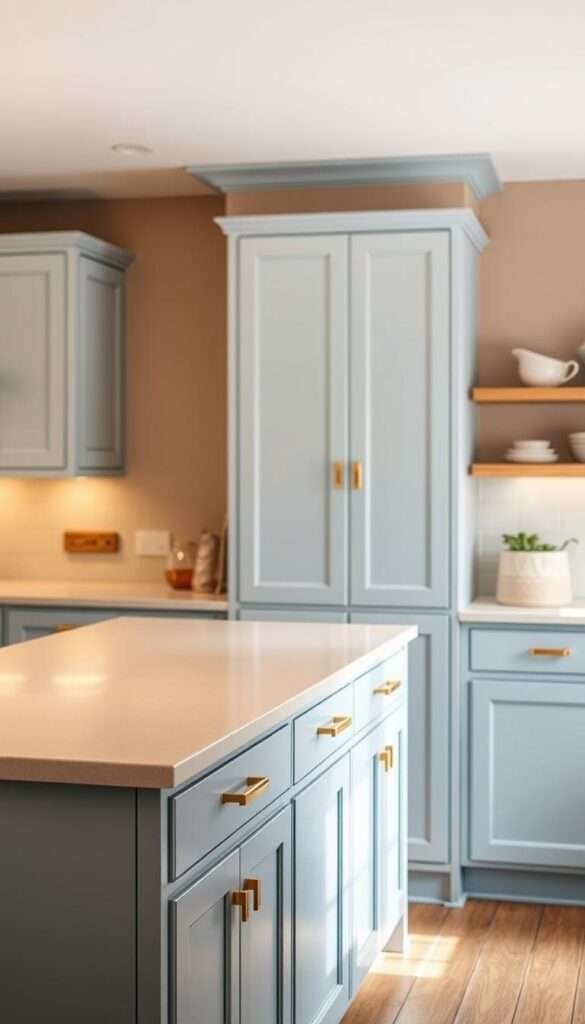
4. Reeded and Fluted Details for Organic Texture
Walking through a client’s renovation last week, I ran my fingers along the vertical grooves of their new oak island—each ridge adding tactile warmth. These details aren’t just decorative; they create rhythm in a space. Reeding (vertical grooves) and fluting (concave channels) turn plain surfaces into storytelling elements.

Wood Reeding on Islands and Cabinets
Charlotte Lucas uses vertical reeding on modern lowers to break monotony. The grooves catch light differently throughout the day, adding movement. For high-traffic zones, reeded MDF outperforms flat panels—it hides scratches and resists dents.
Key benefits:
- Durability: 40% less visible wear over 5 years (2024 Material Study)
- Visual depth: Sarah Sherman Samuel pairs reeded posts with smooth uppers
- Easy upkeep: Use a soft toothbrush for grooves
Fluted Stone Backsplashes and Countertops
POCO Designs carves 3/4″ deep flutes into burgundy marble, nodding to 1970s brutalism. Horizontal channels reflect under-cabinet lighting, casting delicate shadows. For stone selections, prioritize veined materials:
| Material | Best Use | Cost per Linear Foot |
|---|---|---|
| Soapstone | Waterfall islands | $120 (hand-carved) |
| Marble | Backsplashes | $90 |
| Quartz | Countertops | $40 (prefab) |
Ancient Greek columns inspired today’s fluting patterns. Mix textures—like smooth walnut with fluted soapstone—for contrast. The result? A kitchen that feels curated, not cookie-cutter.
5. Painted Window Trims: Small Detail, Big Impact
Trim colors often get overlooked, but they can redefine an entire space. These narrow frames guide the eye, creating rhythm between walls and windows. Designers now treat them as intentional accents rather than afterthoughts.
Warm Green Trims for Cohesive Contrast
Anna Haines’ kitchen pairs warm lower cabinets with Farrow & Ball’s Bancha trim. This deep green bridges indoor spaces with outdoor views. Darker trims have a bonus—they make windows appear larger by framing the glass distinctly.
Follow these rules for lasting results:
- Use exterior-grade paint for moisture resistance
- Limit bold trims to 2-3 windows in compact kitchens
- Match hardware finishes for harmony
Victorian homes pioneered this approach with “picture frame” trim designs. Today, 68% of designers specify colored trims over basic white in remodels.
Bright Blue Beams for Whimsical Flair
Sophie Rowell lowered visual height in a farmhouse kitchen using cobalt ceiling beams. The playful blue echoes her ceramic knobs, proving small details create big personality. Benjamin Moore’s Advance paint works perfectly—it’s durable and wipes clean easily.

- Paint only header beams to maintain airiness
- Use semi-gloss for light reflection
- Sample colors at different times of day
Bright Designlab’s mid-century kitchen shows how contrasting trims energize neutral palettes. Whether you choose earthy greens or sky blues, these accents tell your home’s story.
6. Dark Beige Takes Over as the New Neutral
Beige is no longer just a safe choice; it’s becoming the star of modern kitchens with its warm, sophisticated appeal. Designers now embrace shades from Farrow & Ball’s “London Stone” to moody “Mouse’s Back”, creating spaces that feel both current and timeless.
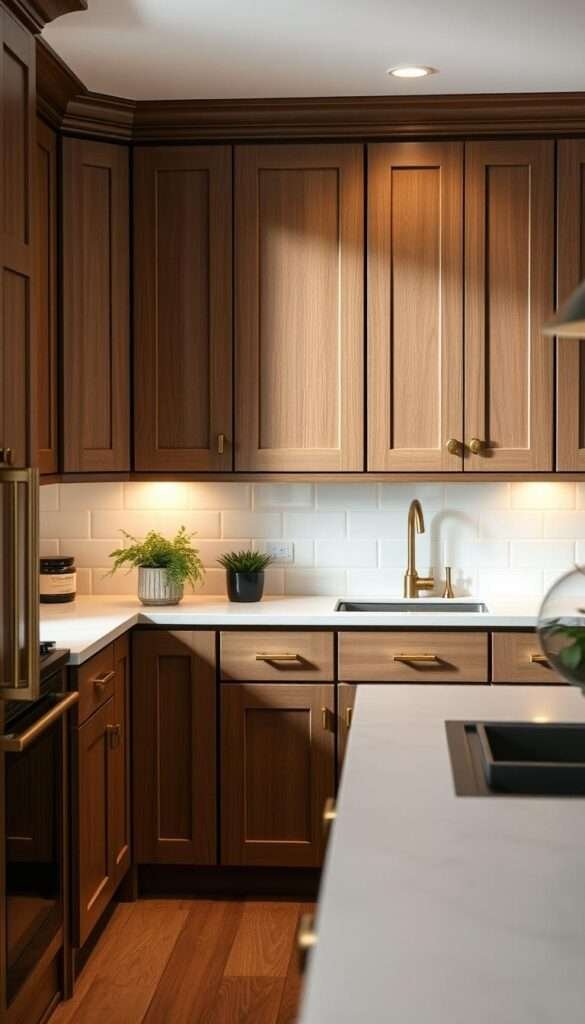
Pairing with Brass or Silver Fixtures
Tali Roth’s project proves silver fixtures add a contemporary edge to dark beige cabinetry. For warmth, Meet West Studio combines unlacquered brass pulls with textured marble counters—a look that ages gracefully.
Key considerations:
- Brass: Develops a patina over time, adding character
- Polished nickel: Reflects light in smaller kitchens
- Blackened steel: Creates striking contrast
Textured Marble Accents for Depth
Merete Coleman’s Hungarian armoire-inspired fridge features a milk-paint finish mimicking aged plaster. This choice pairs perfectly with stacked marble ledger stone backsplashes—their rugged texture balances beige’s softness.
Top countertop materials for beige kitchens:
| Material | Best Feature | Maintenance Level |
|---|---|---|
| Honed Taj Mahal quartzite | Subtle gold veining | Low (sealed) |
| Fluted soapstone | Tactile interest | Medium (oil periodically) |
Lighting matters: 2700K bulbs prevent beige from appearing flat. Sherwin-Williams’ “Natural Linen”, their top-selling 2025 neutral, shines under this warm glow.
Pro tip: Test swatches at dawn and dusk—some beiges shift pink or gray. The right neutral should harmonize with your home’s natural light.
7. Statement Stools: Functional Art for Islands
Stools are no longer just seating; they’re sculptural elements that anchor modern kitchens. These pieces blend utility with personality, turning islands into focal points. I’ve seen clients spend weeks selecting stools—only to fall for designs that surprise them.

Burgundy Pedestal Stools for Moody Contrast
Shapeless Studio’s oxblood leather stools redefine contrast. Their CNC-milled walnut bases and nailhead trim pop against light oak islands. The rich hue adds depth, proving bold functional art can elevate neutral spaces.
Follow these rules for harmony:
- 10-12″ clearance between seat and counter
- 24″ width for 36″ deep islands
- Performance fabrics resist spills
Vintage-Inspired Designs with Mixed Materials
Charlie Ferrer’s rattan-and-iron stools nod to 1950s diners. Leyden Lewis pairs splayed-leg designs with angular islands for balance. This vintage-inspired approach thrives on mixed materials:
- Cerused oak + bouclé for warmth
- Iron + cane for texture contrast
- Fluted stems for movement

| Style | Best For | Durability Tip |
|---|---|---|
| Asymmetrical backs | Modern kitchens | UV-resistant finishes |
| Clear acrylic | Small spaces | Microfiber cleaning |
| Splayed legs | High-traffic areas | Reinforced joints |
Pro tip: Hunt 1stDibs for authentic Milo Baughman stools. These pieces age beautifully, becoming heirlooms you’ll love for years.
8. Colorful Stained Wood Cabinets
The first time I saw YSG Studio’s green-stained cabinets, I realized stains don’t just color wood—they highlight its soul. Unlike paint, which obscures, stains enhance visible grain, turning each swirl and knot into a design feature. This approach celebrates imperfection, creating kitchens with warmth and authenticity.

Green-Stained Upper Cabinets with Visible Grain
YSG Studio’s technique uses multiple thin coats of water-based stain, allowing the oak’s texture to dominate. Their stained wood cabinets prove lighter hues like Osmo 4003 “Mint Green” work best for translucency. For bolder statements, navy-stained ash makes grain patterns pop like marble veins.
Wood selection matters:
- Ash: Pronounced grain ideal for dramatic stains
- Oak: Balanced texture for subtle color washes
- Maple: Tight grain suits minimalist looks
Tonal Hardware for a Streamlined Look
Bidgood Design pairs stained lowers with mortise-mounted pulls in matching bronze. This tonal hardware approach creates seamless flow—no visual interruptions. For contemporary style, Bright Designlab uses recessed finger pulls in stained ash.
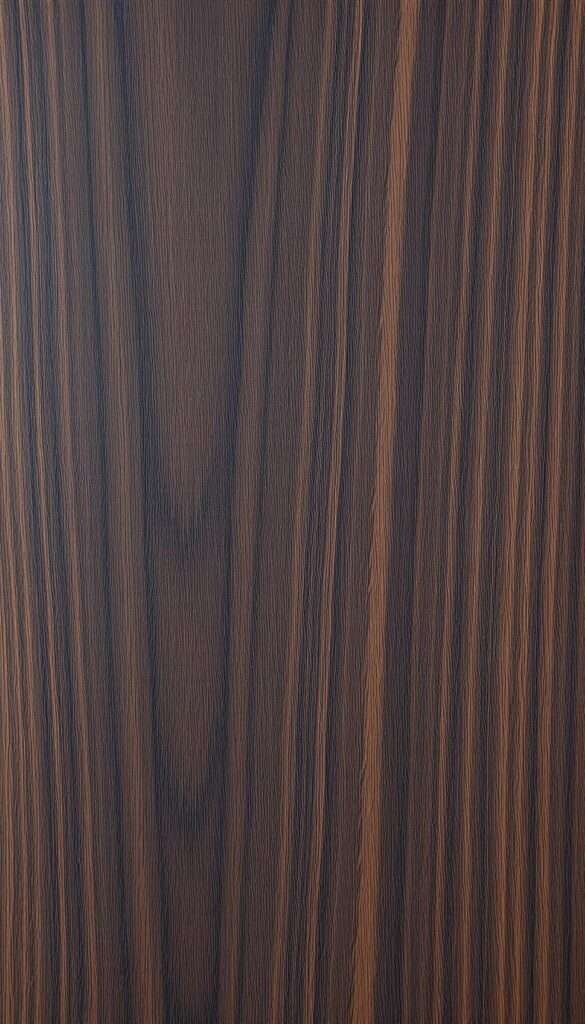
- UV-cured stains eliminate topcoats
- Charred-stain hybrids inspired by shou sugi ban
- Annual oiling preserves depth (use linseed for red tones)
Avoid fleeting trends like ombré staining. Instead, let the wood’s natural character guide your kitchen design—these cabinets age like fine wine.
9. Exposed Joinery and Organic Bauhaus Shelving
My carpenter friend once whispered, “Good joinery is like a secret handshake between wood pieces,” and now I see why. Visible connections celebrate craftsmanship in modern design, turning structural elements into art. This approach blends honesty with beauty—a core Bauhaus principle.
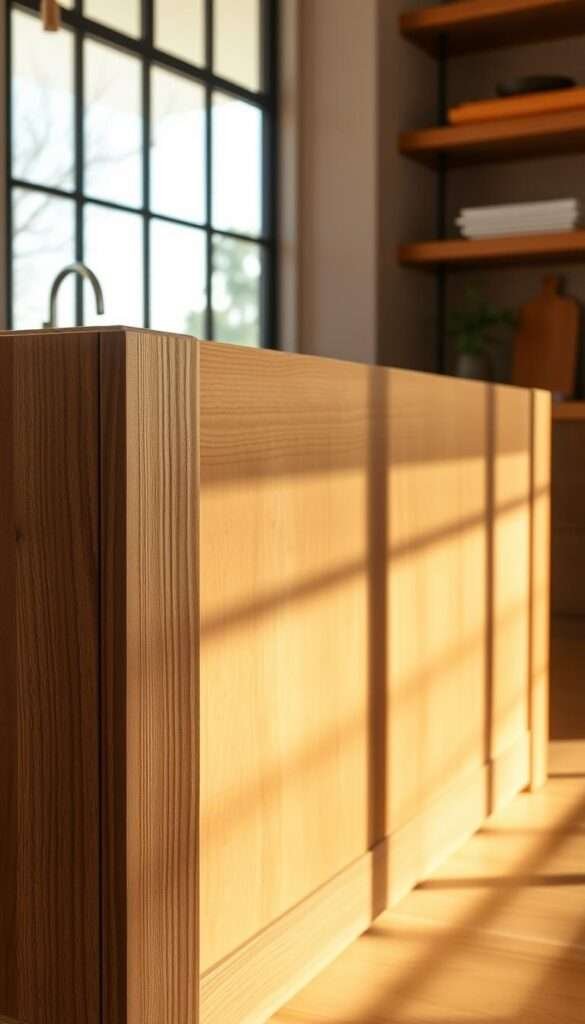
Handcrafted Island Bases with Visible Joints
Rubin Studio’s black walnut island showcases dovetail joints with maple peg accents. Each interlocking piece demonstrates precision while adding visual rhythm. Unlike hidden biscuit joints, these details invite touch and admiration.
Key joinery types compared:
- Dovetail: Strongest for drawers; shows triangular “tails”
- Mortise-and-tenon: Ideal for frame construction; requires chisel work
- Biscuit: Quick alignment; disappears when glued
For contemporary twists, designers now mix materials. Brass dowels through white oak create striking contrast while maintaining structural integrity.
Thick, Matte Wood Frames for Open Shelving
Patrick Maziarski’s Bauhaus-inspired shelves use 2″ thick white oak with blackened steel brackets. The matte finish reduces glare, keeping focus on displayed items. Steel rods inside prevent sagging—critical for heavy cookbooks.
Best woods for load-bearing shelves:
- White oak (most stable)
- Ash (flex-resistant)
- Walnut (aesthetic appeal)

Style these open shelving units with hand-thrown pottery or stacked linen napkins. Remember—dust collects faster without cabinet doors. Weekly cleaning preserves the handcrafted look.
Greene & Greene’s Craftsman details inspire today’s joinery revival. In your home, let wood connections tell their own beautiful story.
10. Ready to Embrace Your Dream Kitchen?

Creating a space you love starts with inspiration. Recent data shows more homeowners are investing in remodels, with spending up 18%. But where to begin?
Mix two or three favorite trends—like rounded islands with stained wood cabinets. Small changes make big impacts. Swap hardware or paint window trims for instant refresh.
Trusted brands like Semihandmade offer quality panels. Avoid over-customizing; focus on timeless elements. Natural materials dominate, with 73% of designs using sustainable options.
Your home should reflect your story. Let these ideas guide, not dictate. Ready to explore? Take our style quiz to find your perfect match.
